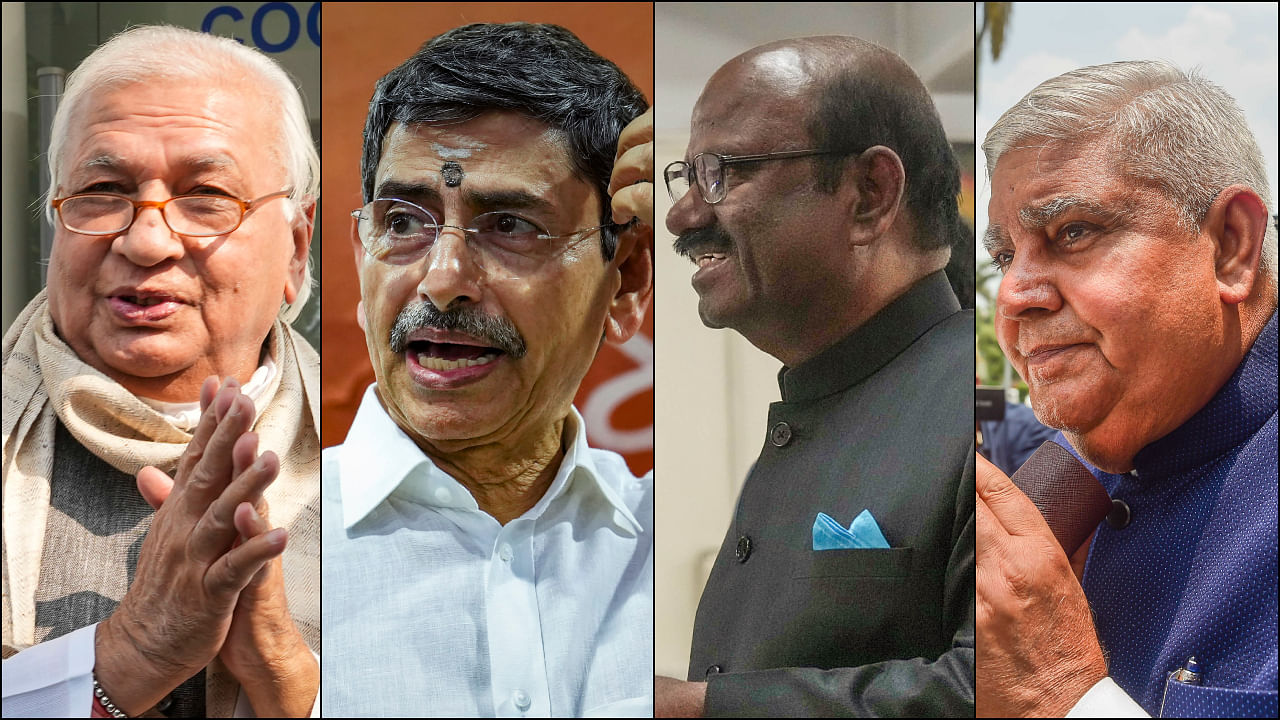
Governors Arif Mohammad Khan of Kerala, RN Ravi of Tamil Nadu, CV Ananda Bose of West Bengal and Ex-Governor of WB Jagdeep Dhankhar (now Vice-President of India).
Credit: PTI Photos
As constitutional statesmen, Governors are key to ensuring neutral adjudication among a state’s different political units. The manner in which they exercise their responsibilities has a direct impact on Union-state relations. That is why they must nudge all the governing institutions of the State to adhere to constitutional values and governance practices. They need to do so especially because political parties, naturally driven by partisan considerations, may occasionally tend to be disruptive (especially in the heat of elections). That is why, for the President and Governors, the polestar must always be the national interest, which is determined solely by the Constitution. This is precisely why India’s first Prime Minister Jawaharlal Nehru strongly held that Governors should “represent before the public someone slightly above the party”.
Consequently, despite the powers they hold and the constitutional immunity they enjoy, Governors must restrain themselves (especially when it comes to the governance of states). While Article 163 of the Constitution does carve out an exception, Governors must remember that those powers are granted only for exceptional circumstances, like when there is a complete breakdown in a state’s constitutional machinery. These powers are to be used judiciously and benignly. Ultimately, the rule of thumb is that Governors cannot appropriate statutory powers just so the Union government can needle Opposition-ruled states.
This has been repeatedly emphasised by numerous Commissions and SC judgements. The Administrative Reforms Commission of 1968, the Rajamanar Committee of 1969, the Committee of Governors of 1971, the Bangalore Seminar of Experts of 1983, and the Sarkaria Commission of 1988 have all established conventions and protocols that make the Governor the “linchpin of the constitutional apparatus of the State”.
Eschewing both constitutional and institutional principles, Raj Bhawans have been reduced to partisan offices deployed to surreptitiously usher in a single-party rule. In the last nine years, Governors have illegally selected Chief Ministers (as in the cases of Goa in 2017, Manipur in 2017, Bihar in 2017, Karnataka in 2018, and Maharashtra in 2019); arbitrarily determined the timing for proving legislative majorities (as in the cases of Arunachal Pradesh and Maharashtra); delayed giving assent to bills or reserved bills for the President’s assent (as in the recent Tamil Nadu controversy). Governors have also overstepped their constitutional Laxman rekha and interfered in the policies of state governments (as in West Bengal, Kerala, Tamil Nadu, and Delhi) and misused their powers as Chancellors of state universities.
This problem is repeatedly occurring because the BJP government has reduced Governors to constitutional hitmen. Rather than serving as instruments to deepen cooperative federalism (something Prime Minister Modi has repeatedly espoused as integral to India), Governors are today being primarily used to install rump governments of the BJP’s preference. The reason why Governors crawl when they are asked to walk is because of a manufactured insecurity created by the Centre. Although Governors are expected to complete a five-year term ‘at the pleasure of the President’ (which is why the Constitution makes no provision for the impeachment of Governors, so as to ensure freedom from any partisan considerations), today they serve ‘at the pleasure of the Prime Minister’. That is why the BJP government quickly removed Governors appointed by the United Progressive Alliance (UPA) government soon after assuming office in 2014 (in contravention of the Supreme Court’s observations that Governors cannot be removed whimsically; see B P Singhal vs Union of India). In (mis)using Governors to wreak havoc on Opposition-ruled states, the BJP government is deforming Indian federalism.
Equally problematically, India consciously institutionalised multiple levels of adjudication to ensure the widest possible arena for negotiation between India’s vast diversities. That arena breaks down if Governors don’t remain neutral adjudicators. This fundamentally robs the Indian people of their democratic choice. Once a state has given mandate to a particular party, the Union government has no business to undermine the people’s choice. Everytime the BJP government does this, they reinforce the notion that they do not see themselves as a government that is by, of, and for the people. And once the people become secondary variables (as has clearly happened in the last few years), governance is no longer about furthering their welfare. Instead, it becomes a tool to retain power through any means (which is partly why the BJP government services the interests of crony capitalists who arm them to further their partisan interests).
The late President A P J Kalam once said, “…the office of the Governor has been bestowed with the independence to rise above the day-to-day politics and override compulsions either emanating from the central system or the state system”. Even though this principle has not always been adhered to, a consensus on what Governors should (and should not) do has painfully evolved over time. It was because of the self-restraint exercised by multiple Union governments (and Governors) that India has prospered and progressed as a Union of States. In undoing that consensus, Prime Minister Modi is not just violating his constitutional raj dharma (again) but also causing irreparable damage to Indian democracy.
(The writer is a former Governor and Union minister. This article draws on her essay in the recent Penguin book ‘The Great Indian Manthan: State, Statecraft and the Republic’)